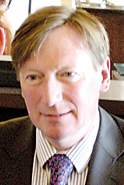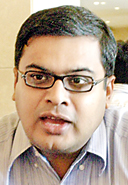Rock and pop add to Trinity College’s diverse performing arts
If you like messing around with drums and guitars why not get yourself a qualification in it? Ever on the look out to broaden its horizons, Trinity College London launched its rock and pop qualification in March this year.
“The Sri Lankan launch was one of the best,” said Trinity College London, National Co-ordinator (India) and International Executive (Indian Subcontinent), Sachin H Das.
 Mark Stringer |
 Sachin Das |
He added that they want people to enjoy music and that they will be constantly updating the rock and pop syllabus. “The syllabus includes music ranging from the Beatles to contemporary music such as that of Rihanna” he said.
From English language to Music to Speech and Drama Trinity College London offers students a chance to obtain qualifications in a wide range of performing arts. Trinity is certainly a hub of activity conducting approximately 600,000 assessments worldwide per year.
“It is all about various forms of communication,” said Trinity College London, Representative for India, M. H. Das.
With the aim of giving students overseas the opportunity to obtain Trinity College qualifications, Trinity College, starting with music ventured beyond the shores of the UK becoming the first to hold international examinations overseas. The standard of the Trinity qualifications are the same in all the countries.
“It is great to be working with a team as part of an organisation spanning over 60 countries,” enthused Senior Consultant, Trinity College London, Mark Stringer adding that this gave him the opportunity to meet teachers and share ideas.
“Having regional representation enables the pouring in of ideas from around the world as well as ideas radiating back to the regions,” said Sachin.
Until recently, the examination board at Trinity was UK-centric. However, sensing the need to have more representation from around the world, Trinity decided two years back to introduce Regional Representation.
Sachin went on to say that this system gives more voice to the regions and would bring to light the local needs. “We need to work with the local people and meet the requirements of the local market.” Therefore, Sri Lanka too now works closely with Sachin and his team.
“We have centres in Galle, Matara, Kandy, Negombo, Ratnapura and Nuwara Eliya and are ready to open more if the need arises,” explained National Representative for Sri Lanka, Trinity College London, Ramola Sivasundaram, speaking of the work done in Sri Lanka.
Evidently Sri Lanka manages to hold her own in the world of performing arts. “The English language qualification candidates are of a very high calibre,” said Ramola adding that Speech and Drama and Music too produce candidates of a high standard, though there is room for improvement as well.
“This may be partly due to the fact that teachers themselves need help,” explained Ramola adding that they hold various teacher support programmes conduct workshops and give feedback.
“Usually the teachers meet the examiners following the completion of the exams in order to obtain feedback,” said Ramola adding that however, Trinity has now felt that the teachers would benefit more from continuous feedback and assistance with their teaching. Therefore, the Building Teacher Communities (BTC) programme was introduced.
“BTC serves as an effective forum for teachers to voice their ideas as well as their difficulties” said Sachin, adding that they are also developing a Continuing Professional Development programme where teachers can meet and discuss issues that concern them online.
Spreading its musical tentacles
Originally part of the Trinity College of Music, Trinity devised the world’s first music grade and diploma examinations. Since then, Trinity College has expanded and developed its range of arts and English language qualifications. In 1993 Trinity College London was established as an independent examination board. In 2004 Trinity College London amalgamated with Guildhall Examinations Service creating the Trinity Guildhall brand which covers Trinity’s range of arts assessments. Trinity offers a wide range of syllabuses to suit a variety of teaching and learning styles, varying from graded examinations and certificates to diplomas and higher-level vocational qualifications.
Follow @timesonlinelk
comments powered by Disqus






















